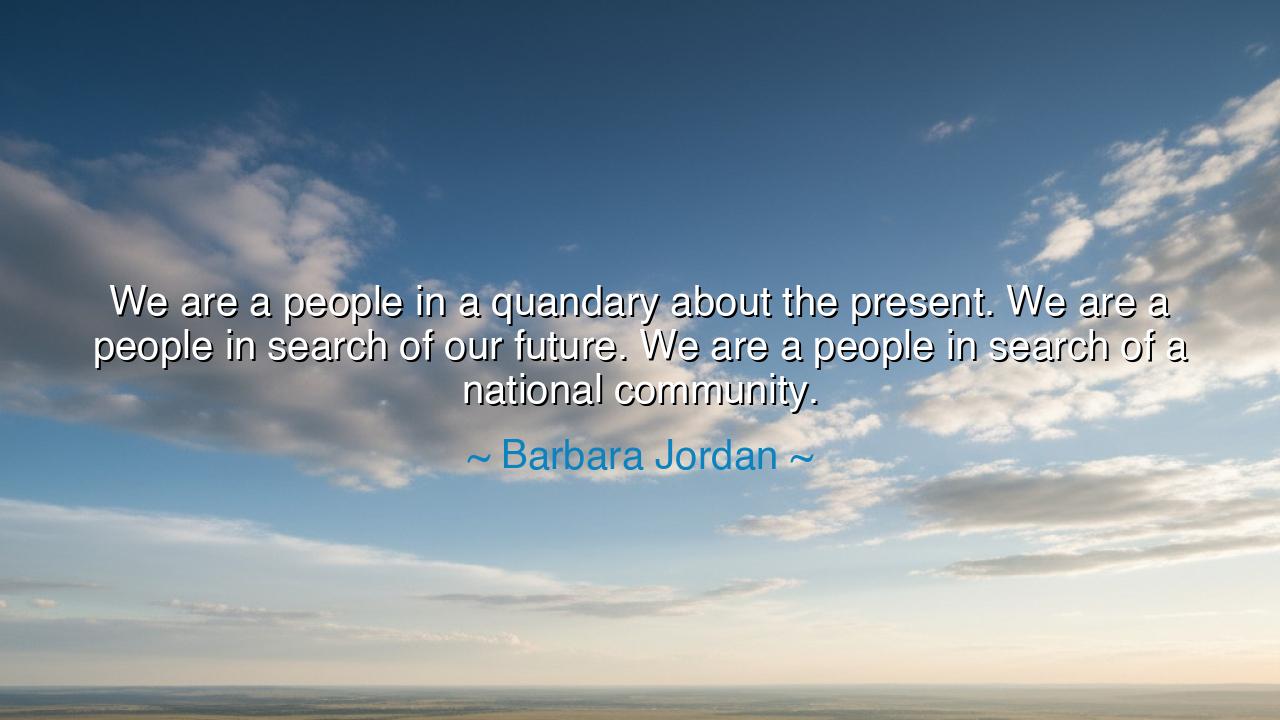
We are a people in a quandary about the present. We are a people
We are a people in a quandary about the present. We are a people in search of our future. We are a people in search of a national community.






"We are a people in a quandary about the present. We are a people in search of our future. We are a people in search of a national community." With these words, Barbara Jordan, the great American politician and advocate for justice, lays bare the collective struggle of her people—a people caught in the throes of uncertainty, yearning for a sense of belonging and a vision for the future. These words, like a clarion call, echo through the ages, for they speak not just to a single generation, but to every society that has faced moments of internal confusion and dislocation. They capture the essence of the human condition—the desire to understand the present, to shape the future, and to forge a community that binds people together in solidarity and purpose.
The present moment is often elusive. Like a ship lost in the fog, societies and individuals alike struggle to find their bearings in an ever-changing world. Barbara Jordan speaks of a quandary, a state of confusion or uncertainty that grips the people of her time. It is the same quandary faced by countless civilizations throughout history when confronted with rapid change and disruption. Consider the time of Rome's decline, when the empire, once united and powerful, began to crumble under the weight of internal conflict and external threats. The Romans, much like the people Jordan describes, found themselves in search of a direction—unsure of how to navigate the complexities of their present, while still holding on to a vision of the future.
This tension between the present and the future is one of the oldest dilemmas faced by humanity. The ancient Greek philosophers, such as Socrates and Plato, grappled with similar questions. They sought to understand not only the present state of the world but also how the future could be shaped by the virtues and actions of individuals. Socrates, in his search for wisdom, famously declared that "The unexamined life is not worth living," urging people to seek understanding in the present so that they might shape a better future. The idea of self-examination and reflection remains a cornerstone of human progress, for it is through such reflection that we find the courage and wisdom to build something better than what we currently have.
In her words, Jordan also highlights the search for a national community—a unifying vision that transcends the divisions of race, class, and ideology. To be a people in search of community is to seek a collective identity, something that binds individuals together in a shared purpose. Mahatma Gandhi, during India’s struggle for independence, understood the power of such a vision. He spoke not just of freeing India from British rule, but of creating a society based on truth, justice, and nonviolence. The vision of this new India united millions of people from different backgrounds and cultures, giving them a common purpose to rally around. Like India, the American people have long been in search of a national community, a place where unity is forged through shared ideals, where all are equal, and where justice prevails.
The lesson in Jordan's words, then, is both a call to action and a reflection on the path forward. She compels us to ask ourselves: Are we content to remain lost in the fog of the present, unsure of our direction? Or will we rise to the challenge and seek to understand our time—examining our values, our systems, and our relationships—so that we might forge a future that aligns with our highest ideals? Just as Martin Luther King Jr. painted a vision of an America where people are judged not by the color of their skin but by the content of their character, so too must we be willing to dream of a nation where unity, justice, and equality are the cornerstones of our society.
In our own lives, we must follow Jordan’s call to reflection and action. First, let us examine our own present, acknowledging the struggles and challenges we face. But let us not become mired in despair. Instead, let us reflect on the future we wish to create—a future where community is not a distant dream, but a living, breathing reality. Then, let us act, just as the great leaders of history did, by striving for unity, justice, and truth. Whether in our families, our communities, or our nations, we must work to forge connections and build the kind of society where every individual is valued and where our collective future is shaped by the wisdom of the past.
Finally, let the action be our guide. Do not wait for the future to be handed to you. Go forth and shape it, one decision at a time. Just as Barbara Jordan called on her people to seek the future and build the community, so too must we take ownership of our own destinies. The search for community is not passive; it requires effort, reflection, and the courage to act in the present to create a better world for those who come after us. Let us, too, be a people in search—not just of a future, but of a purpose and a vision that will unite us all.






AAdministratorAdministrator
Welcome, honored guests. Please leave a comment, we will respond soon